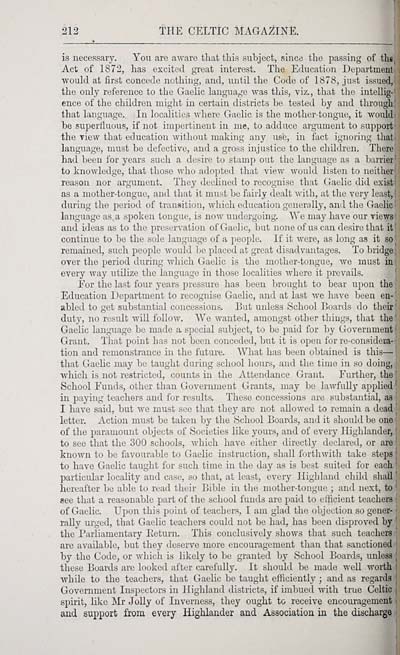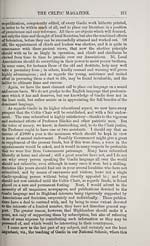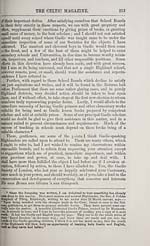Blair Collection > Celtic magazine > Volume 3
(222)
Download files
Complete book:
Individual page:
Thumbnail gallery: Grid view | List view

212 THE CELTIC MAGAZINJE.
is necessary. You are aware that tliis subject, since the passing of ths,
Act of 1872, has excited great interest. The Education Department
would at first concede nothing, and, until the Code of 1878, just issued,
the only reference to the Gaelic language was this, viz., that tlie intellig-
ence of the children might in certain districts be tested by and tlu'ough
that language.. In localities where Gaelic is the mother-tongue, it would
be superfluous, if not impertinent in me, to adduce argument to support
the yiew that education without making any use, in fact ignoring that'
language, must be defective, and a gross injustice to the cliildren. There'
had been for years such a desire to stamp out the language as a barrier'
to knowledge, that those Avho adopted that view would listen to neither;
reason nor argument. They declined to recognise that Gaelic did exist
as a mother-tongue, and tliat it must be fairly dealt with, at the very least, !
during the period of transition, which education generally, anil the Gaelic'
language as a spoken tongue, is now undergoing. We may have our views'
and ideas as to the preservation of Gaelic, but noneof us can desire that it'
continue to be the sole language of a people. If it were, as long as it so \
remained, such people would be placed at great disadvantages. To bridge
over the period during which Gaelic is the mother-tongue, we must in
every way utilize the language in those localities where it prevails.
Eor the last four years pressure has been brought to bear upon the
Education Department to recognise Gaelic, and at last we have been en- \
abled to get substantial concessions. But unless School Boards do their ]
duty, no residt wiU follow. We wanted, amongst other things, that the'
Gaelic language be made a special subject, to be paid for by Government
Grant. That point has not been conceded, but it is open for re-considera-
tion and remonstrance in the future. What has been obtained is this — ■
that Gaelic may be taught during school hours, and the time in so doing,
which is not restricted, counts in the Attendance Grant. Eurther, the
School Funds, other than Govermnent Grants, may be lawfully applied i
in paying teachers and for results. These concessions are substantial, as '
I have said, but we must see that they are not allowed to remain a dead '
letter. Action must be taken by the School Boards, and it should be one
of the paramoimt objects of Societies like yours, and of every Highlander,
to see that the 300 schools, which have either directly declared, or are j
known to be favourable to Gaelic instruction, shall forthwith take steps
to have Gaelic taught for such time in the day as is best suited for each. ■
particidar locality and case, so that, at least, every Highland chUd shall |
hereafter be able to read their Bible in the mother-tongue ; and next, to '
see that a reasonable part of the school funds are paid to efficient teachers
of Gaelic. Upon this point of teachers, I am glad the objection so gener-
rally urged, that Gaelic teachers could not be had, has been disproved by '
the Parliamentary Eeturn. This conclusively shows that such teachers ;
are available, but they deserve more encouragement than that sanctioned j
by the Code^ or which is likely to be granted by School Boards, unless j
these Boards are looked after carefully. It should be made well worth j
while to the teachers, that Gaelic be taught efficiently ; and as regards j
Government Inspectors in Highland districts, if imbued with true Celtic j
spirit, lilce ]\Ir Jolly of Inverness, they ought to receive encoui-agement |
and support from every Highlander and Association in the discharge j
is necessary. You are aware that tliis subject, since the passing of ths,
Act of 1872, has excited great interest. The Education Department
would at first concede nothing, and, until the Code of 1878, just issued,
the only reference to the Gaelic language was this, viz., that tlie intellig-
ence of the children might in certain districts be tested by and tlu'ough
that language.. In localities where Gaelic is the mother-tongue, it would
be superfluous, if not impertinent in me, to adduce argument to support
the yiew that education without making any use, in fact ignoring that'
language, must be defective, and a gross injustice to the cliildren. There'
had been for years such a desire to stamp out the language as a barrier'
to knowledge, that those Avho adopted that view would listen to neither;
reason nor argument. They declined to recognise that Gaelic did exist
as a mother-tongue, and tliat it must be fairly dealt with, at the very least, !
during the period of transition, which education generally, anil the Gaelic'
language as a spoken tongue, is now undergoing. We may have our views'
and ideas as to the preservation of Gaelic, but noneof us can desire that it'
continue to be the sole language of a people. If it were, as long as it so \
remained, such people would be placed at great disadvantages. To bridge
over the period during which Gaelic is the mother-tongue, we must in
every way utilize the language in those localities where it prevails.
Eor the last four years pressure has been brought to bear upon the
Education Department to recognise Gaelic, and at last we have been en- \
abled to get substantial concessions. But unless School Boards do their ]
duty, no residt wiU follow. We wanted, amongst other things, that the'
Gaelic language be made a special subject, to be paid for by Government
Grant. That point has not been conceded, but it is open for re-considera-
tion and remonstrance in the future. What has been obtained is this — ■
that Gaelic may be taught during school hours, and the time in so doing,
which is not restricted, counts in the Attendance Grant. Eurther, the
School Funds, other than Govermnent Grants, may be lawfully applied i
in paying teachers and for results. These concessions are substantial, as '
I have said, but we must see that they are not allowed to remain a dead '
letter. Action must be taken by the School Boards, and it should be one
of the paramoimt objects of Societies like yours, and of every Highlander,
to see that the 300 schools, which have either directly declared, or are j
known to be favourable to Gaelic instruction, shall forthwith take steps
to have Gaelic taught for such time in the day as is best suited for each. ■
particidar locality and case, so that, at least, every Highland chUd shall |
hereafter be able to read their Bible in the mother-tongue ; and next, to '
see that a reasonable part of the school funds are paid to efficient teachers
of Gaelic. Upon this point of teachers, I am glad the objection so gener-
rally urged, that Gaelic teachers could not be had, has been disproved by '
the Parliamentary Eeturn. This conclusively shows that such teachers ;
are available, but they deserve more encouragement than that sanctioned j
by the Code^ or which is likely to be granted by School Boards, unless j
these Boards are looked after carefully. It should be made well worth j
while to the teachers, that Gaelic be taught efficiently ; and as regards j
Government Inspectors in Highland districts, if imbued with true Celtic j
spirit, lilce ]\Ir Jolly of Inverness, they ought to receive encoui-agement |
and support from every Highlander and Association in the discharge j
Set display mode to: Large image | Transcription
Images and transcriptions on this page, including medium image downloads, may be used under the Creative Commons Attribution 4.0 International Licence unless otherwise stated. ![]()
| Early Gaelic Book Collections > Blair Collection > Celtic magazine > Volume 3 > (222) |
|---|
| Permanent URL | https://digital.nls.uk/76446033 |
|---|
| Description | Volume III, 1878. |
|---|---|
| Shelfmark | Blair.4 |
| Attribution and copyright: |
|
| Description | A selection of books from a collection of more than 500 titles, mostly on religious and literary topics. Also includes some material dealing with other Celtic languages and societies. Collection created towards the end of the 19th century by Lady Evelyn Stewart Murray. |
|---|
| Description | Selected items from five 'Special and Named Printed Collections'. Includes books in Gaelic and other Celtic languages, works about the Gaels, their languages, literature, culture and history. |
|---|

